Brain games offer new ways of learning for kids that are always curious and constantly seeking new insights. Brain games for kids also challenge children’s existing knowledge on their favorite subjects, through gamification and engaged learning.
Math & ELA | PreK To Grade 5
Kids see fun.
You see real learning outcomes.
Watch your kids fall in love with math & reading through our scientifically designed curriculum.
Parents, try for free Teachers, use for free
Children can also emerge as more active learners when they have fun in a gamified environment that is conducive to learning. The best brain games are the ones that can focus on specific areas of the child’s development. They work on motor skills, memory, verbal recall, pattern recognition, trends detection, etc.
You should opt for good brain games for kids that are digital-first and can be played individually or with friends through productive screen time. Let’s explore 25 fun brain games for kids free of cost that improves their overall development.
Looking for more free online math games and ELA games to educate and engage your kids? Here are more games to check out!
Here are the 25 best brain games for kids

1. Remember the items!
You can present a tray full of exciting and unique items for 5-10 seconds and cover it up afterward for your children to recall each one. Rewarding kids can make the memory game even more fun when correctly guessing each one.
Age Range – 4 years and older
Tools Needed – Tray, sheet, toys, items,
Special Note – You can make the game more challenging with more items
2. 100-piece jigsaw puzzles
This classic brain game is ideal for improving fine motor skills, pattern detection, image recognition, and problem-solving. Kids can also learn about collaboration to finish a task at hand, as well as the important skill of delayed gratification.
Age Range – 4 years and older
Tools Needed – Puzzle, printable sheet
Special Note – Having larger puzzle sizes makes it more compelling for older kids
3. Rubik’s cube
You can make a Rubik’s cube fun by giving your children the basic strategies they need to finish them correctly. You can follow online tutorials, play with friends, and get better at the brain game over time. This teaches your kids the importance of skill development and memory.
Age Range – 4 years and older
Tools Needed – Rubik’s cube starter pack
Special Note – You can encourage your child to play with the cube during their idle time
4. Online learning games
A new approach to online learning is key for kids to learn through animated games. You can leverage SplashLearn and other top online learning platforms to play games about counting, number systems, logarithms, and other key concepts.
Age Range – 4 years and older
Tools Needed – Tablet/smartphone, an online account on platforms such as SplashLearn
Special Note – A platform that allows for self-directed learning is best
5. What do I see? What do I spy?
While the game’s objective is to ask questions to find the right object, you can make it more challenging by making it theme based. You can also play this game indoors and outside, making it a dynamic experience for kids to improve their visual memory and recall skills.
Age Range – 3 years and older
Tools Needed – Reward
Special Note – Playing it with multiple kids makes it more challenging
6. Let’s make a one-word story
You can have a group of kids create an exciting story of at least 30 words by speaking one word aloud at a time. This activity can help spark a child’s inner creative problem solver and improve their grasp of the language.
Age Range – 4 years and older
Tools Needed – Paper
Special Note – Prompting a theme, such as pirates, or animals, will help
7. Chess – The old classic
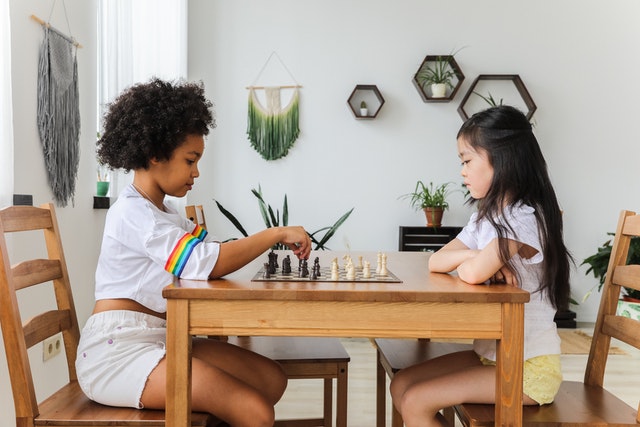
Chess is undoubtedly one of the top brain games for kids to play as it allows them to get involved in an intellectually stimulating experience. They can learn new moves, build around a community, and explore complex ideas in their minds.
Age Range – 5 years and older
Tools Needed – Chess set, online videos
Special Note – Creating a rich backstory around the chess pieces will boost the fun of the experience
8. Scavenger hunt
A scavenger hunt can be designed with clues representing themselves as math and English problems. Your children can use their creative thinking capabilities to solve for the right clue and find the item requested.
Age Range – 5 years and older
Tools Needed – List making stationery, rewards/prize
Special Note – You can play this in groups to get kids thinking collectively
9. Role-playing our futures

You can assign specific roles, tasks, responsibilities, and relationships to a large group of kids, allowing them to focus on achieving particular objectives by working together. This improves their interpersonal skills, deductive reasoning skills, and problem-solving capabilities.
Age Range – 4 years and older
Tools Needed – Task sheet, stickers, labels, reward
Note – This brain game is excellent for playing with more than 5 kids
10. Mapping the neighborhood
You can have your kids draw out the map of your neighbourhood with crayons, pencils, and paper. They can get as specific or generic as possible,
and you can provide the right prompts to make the map proportional.
Age Range – 6 years and older
Tools Needed – Map reference, sheet, stationery
Note – You can even make multiple maps after walking through the neighborhood
11. Brain teasers for fun learning
Brain teasers are exciting and fun when done to engage kids to think laterally. You can solve brain teasers collaboratively and help your child think outside the box to solve more challenging questions.
Age Range – 4 years and older
Tools Needed – Brain teaser sheet
Special Note – Provide clues or guidance when starting off
Related Reading: 20 Best Brain Teasers for Kids to Enhance Focus & Memory
12. Letters worksheets
One of the easiest ways to have bundles of fun playing brain games for kids is to opt for worksheets. You can print them off online platforms and let your child solve a few of them for a prize. This incentivizes active learning, while making it more fun through visual learning and application.
Here, you can print out some amazing downloadable letter worksheets.
Age Range – 4 years and older
Tools Needed – Printable sheet
Special Note – Mixing up worksheets across math, science, and English, will be more fun for kids
13. Verbal Venn connections
Verbal Venn types of brain games can help kids build connections between two distinct categories or objects. They can list commonalities between two subject areas and prepare a Venn diagram to apply theoretical knowledge practically.
Age Range – 6 years and older
Tools Needed – Verbal
Special Note – You can encourage your child to develop more nuanced similarities
14. Touch the right color
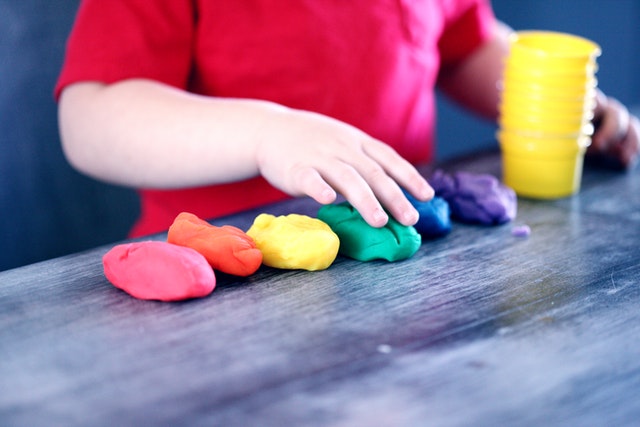
This game is perfect for younger kids who are just learning about different colors. You can start with a stack of primary and secondary colors and then advance to more complex expressions. This brain game involves memory recall and visual cortex processing in young kids.
Age Range – 3 years and older
Tools Needed – Printable sheet, clay, colors
Special Note – You can even use objects to help them strengthen their learning
15. Letter rapid fire
You can play brain games for kids online in the form of rapid-fire questions. You can give your child 20 seconds to come up with as many words as possible with a single starting letter. You can also mix it up by having all words end with another letter.
Age Range – 6 years and older
Tools Needed – Verbal, online tracker, clock
Special Note – You can play these brain games online as well with remote friend groups
16. Math Pictionary
You can play this brain game for kids with a twist. By having all the clues be about math, science, and other subjects your kids love, you can make the game more focused, and skills based. You can also add a timer to make it more challenging.
Age Range – 7 years and older
Tools Needed – Sheets, markers
Special Note – You can make multiple clues based on different subjects
17. Guess the musical note

This is one of kids’ favorite brain games if they love music. You can play a specific note on the piano or guitar and have them play it back. You can do so with chords, melodies, and other interesting combinations.
Age Range – 7 years and older
Tools Needed – Instrument, online video
Special Note – You can even play the note through a video
18. Emoji Game
This simple-to-play game asks kids to guess the correct word based on emojis. This is a great way to get younger kids acquainted with complex terms, especially if they are having a hard time with language constructs.
Age Range – 3 years and older
Tools Needed – Phone, score sheet
Special Note – You can make multiple clues based on different subjects
19. Spot the difference game
You can play the difference game online and printable sheets with your kids. You should focus on more visual context cues if your children are younger. It is one of the best brain games for kids online, especially if they love animals and dinosaurs.
Age Range – 3 years and older
Tools Needed – Online, printable sheet
Special Note – You can provide prompts if they get confused early
20. Hand-eye coordination
You can have your kids follow along as you make different movements with your fingers. You can create different patterns by moving two fingers side-to-side and closing your first. You can have your kids copy your movements to help them improve their motor memory skills.
Age Range – 4 years and older
Tools Needed – None
Special Note – Going faster will test their abilities better
21. Remember the sequence
You can share a series of events, a list of objects, movements, or games, and have your kids recall them backward. You can make it more challenging by introducing bilingual clues, puzzles, and other exciting hurdles.
Age Range – 6 years and older
Tools Needed – Props
Special Note – You can ask them to come up with different sequences as well
22. Recreating patterns on paper
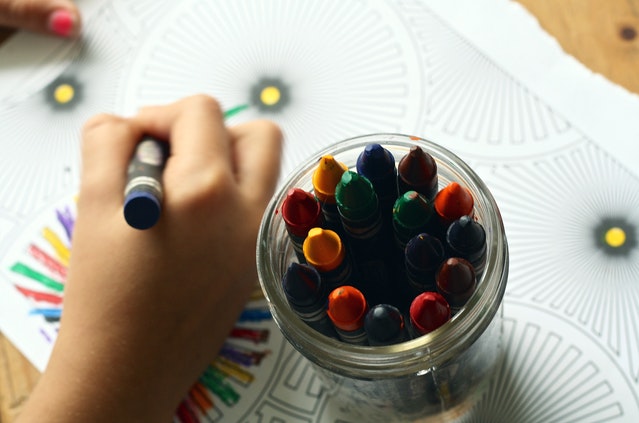
Patterns are really good brain games for kids to play if they love problem-solving. You can create a design with dots and lines and have your child recreate it from memory. When starting the exercise, you can also start with a simple zigzag or U-shaped pattern.
Age Range – 4 years and older
Tools Needed – Sheet, colors
Special Note – Encouraging your child to focus on the pattern will produce better results
23. Dual-handed designs
To stimulate both sides of the child’s mind, you can have them follow along a wave shape using both hands simultaneously. This will enable your child to access both sides of their brain and solve a unique challenge with new processes.
Age Range – 3 years and older
Tools Needed – Sheet, pencil
Special Note – Allowing them to go slower will help them get comfortable
24. Find the main idea
You can have your child read a story or narrative and ask them to decode the main idea behind the text. They can also use the online version of this brain game for kids at SplashLearn.
Age Range – 4 years and older
Tools Needed – Tablet, smartphone
Special Note – You can have them play multiple games to continue exploring the topic
25. Solving mazes
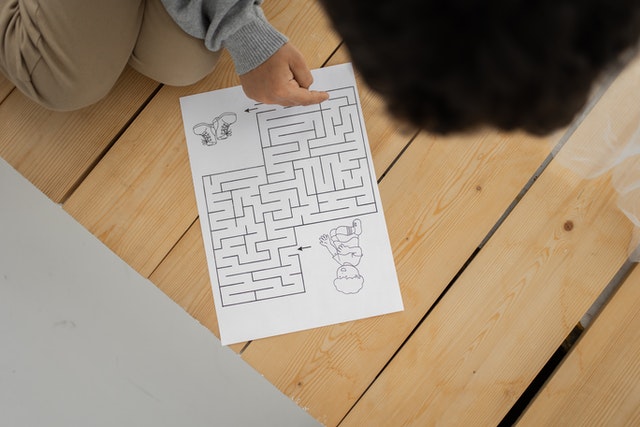
Mazes help kids solve problems at a much faster rate. It tests their ability to remember the right path through trial & error. They can also find the right way by navigating mentally and then committing to pen and paper.
Age Range – 5 years and older
Tools Needed – Printable sheet
Special Note – More complex mazes can be split into multiple parts for ease of solving
Things to Remember While Playing Brain Games With Your Child
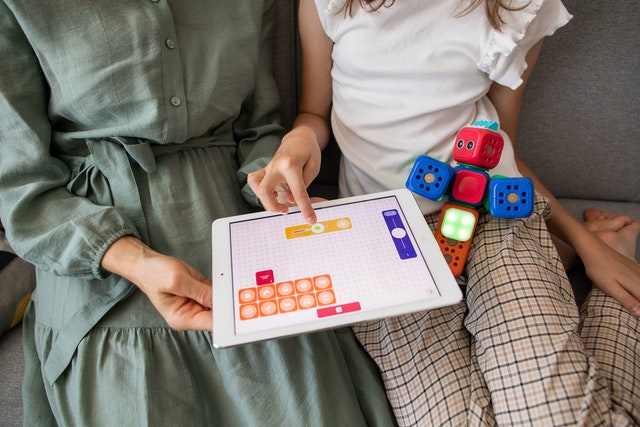
There are several aspects to remember when playing games with your children that you can focus on when selecting and running a game. You should ensure that your child is actively participating in the events of the game organically. If the selected game isn’t fun, your child will not take away the lessons made available to them.
- Add multiple sensory-based games to maximize learning time with your child.
- Make the gaming experience interactive and interesting for your child.
- Use the right online educational gaming solution to improve academic skill areas.
- Involving kinesthetic experiences, such as moving around, picking objects, using pen & paper, etc., will allow for a more well-rounded experience.
- Games involving animated buddies, fun exercises, and unique experiences will be more enriching for younger kids.
- Games involving memory tests and verbal recall will also be highly effective for overall development.
Explore more online educational resources and printable worksheets for kids that will aid in their learning experience.
Frequently Asked Questions (FAQs)
Which brain game is best for skill development for kids?
Games such as I-spy, sudoku, puzzles, and musical games are great for skill development for kids.
What is the best memory game for kids?
Using picture bingo, brain boxes, and number strings can be effective for memory development for kids.
Are puzzles a good way to develop a child’s brain?
Yes, different types of puzzles can be used for holistic development. Younger kids can be given visually oriented puzzles to keep them engaged and actively learning.
How can I stimulate my 4-year-old child’s brain?
You can use online games, such as SplashLearn, and offline games, such as word hunt, color code, mastermind, etc. can help stimulate your young child’s brain organically.
























